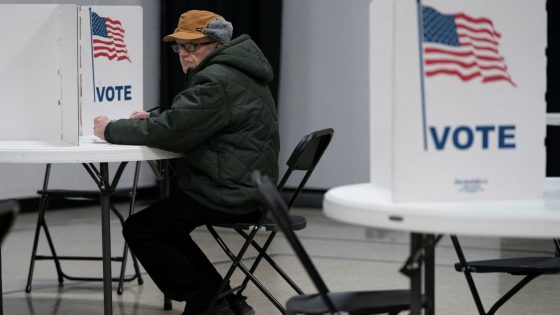Wisconsin resident Derrick Simonson votes in the Presidential Primary election at the Central Assembly of God church polling place in Douglas County in Superior, Wisconsin, U.S. April 2, 2024.Â
Erica Dischino | Reuters
The share of voters who say they have high interest in the 2024 election has hit a nearly 20-year low at this point in a presidential race, according to the latest national NBC News poll, with majorities holding negative views of both President Joe Biden and former President Donald Trump.
The poll also shows Biden trimming Trump’s previous lead to just 2 points in a head-to-head contest, an improvement within the margin of error compared to the previous survey, as the president bests Trump on the issues of abortion and uniting the country, while the former Republican president is ahead on competency and dealing with inflation.
And it finds inflation and immigration topping the list of most important issues facing the country, as just one-third of voters give Biden credit for an improving economy.
But what also stands out in the survey is how the low voter interest and the independent candidacy of Robert F. Kennedy Jr. potentially scramble what’s been a stable presidential contest with more than six months until Election Day. While Trump holds a 2-point edge over Biden in head to head , Biden leads Trump by 2 points in a five-way ballot test including Kennedy and other third-party candidates.
“I don’t think Biden has done much as a president. And if Trump gets elected, I just feel like it’s going to be the same thing as it was before Biden got elected,” said poll respondent Devin Fletcher, 37, of Wayne, Michigan, a Democrat who said he’s still voting for Biden.
“I just don’t feel like I have a candidate that I’m excited to vote for,” Fletcher added.
Another poll respondent from New Jersey, who declined to provide her name and voted for Biden in 2020, said she wouldn’t be voting in November.
“Our candidates are horrible. I have no interest in voting for Biden. He did nothing. And I absolutely will not vote for Trump,” this voter said.
Democratic pollster Jeff Horwitt of Hart Research Associates, who conducted this survey with Republican pollster Bill McInturff of Public Opinion Strategies, said that “Americans don’t agree on much these days, but nothing unites the country more than voters’ desire to tune this election out.”
The poll was conducted April 12-16, and it comes during yet another turbulent time in American politics, including the beginning of Trump’s criminal trial in New York, as well as new attacks and heightened tensions in the Middle East.
According to the poll, 64% of registered voters say they have a high level of interest in November’s election â registering either a “9” or a 10″ on a 10-point scale of interest.
That’s lower than what the NBC News poll showed at this same point time in the 2008 (74%), 2012 (67%), 2016 (69%) and 2020 (77%) presidential contests.
The question dates back to the 2008 election cycle. The lowest-ever level of high election interest in the poll during a presidential cycle was in March 2012 â at 59%. But it quickly ticked up in the next survey.
This election cycle, high interest has been both low and relatively flat for months, according to the poll.
McInturff, the Republican pollster, says the high level of interest in the poll has “always been a signal for the level of turnout” for a presidential contest.
“It makes it very hard for us to predict turnout this far in advance of November, but every signal is turnout will be a lower percentage of eligible voters than in 2020,” he said.
By party, the current poll shows 70% of self-identified Republicans saying they have high interest in the upcoming election, versus 65% of Democrats who say this.
Independents are at 48%, while only 36% of voters ages 18 to 34 rate themselves as highly interested in the election.
“They just aren’t low interest,” McInturff said of young voters. “They are off-the-charts low.”
Biden trims Trump’s lead
The poll also finds Trump narrowly ahead of Biden by 2 points among registered voters in a head-to-head matchup, 46% to 44% â down from Trump’s 5-point advantage in January, 47% to 42%.
That movement, within the poll’s margin of error of plus or minus 3.1 percentage points, is consistent with what other national polls have showed in the Trump-Biden race.
Trump’s biggest advantages are among men (53% to 37%), white voters (54% to 37%) and white voters without college degrees (65% to 25%).
Biden’s top advantages are among Black voters (71% to 13%), women (50% to 39%) and Latinos (49% to 39%).
The poll shows the two candidates are essentially tied among independents (Biden 36%, Trump 34%) and voters ages 18-34 (Biden 44%, Trump 43%). One of the big polling mysteries this cycle is whether young voters have defected from Biden (as the NBC News poll has shown over multiple surveys), or whether Democrats have maintained their advantage among this demographic.
When the ballot is expanded to five named candidates, Biden takes a 2-point lead over Trump: Biden 39%, Trump 37%, independent Robert F. Kennedy 13%, Jill Stein 3% and Cornel West 2%.
Again, that result between Biden and Trump is within the poll’s margin of error.
Notably, the poll shows a greater share of Trump voters from the head-to-head matchup supporting Kennedy in the expanded ballot compared with Biden voters, different than the results of some other surveys.
The president’s approval rating ticks up to 42%
Additionally, the poll shows 42% of registered voters approving of Biden’s overall job performance â up 5 points since January’s NBC News poll, which showed Biden at the lowest point of his presidency.
Fifty-six percent of voters say they disapprove of the job he has done, which is down 4 points from January.
Biden’s gains over the past few months have come from key parts of his 2020Â base, especially among Democrats and Black voters. But he continues to hold low ratings among Latinos (40% approval), young voters (37%) and independents (36%).
“The data across this poll show that Joe Biden has begun to gain some ground in rebuilding his coalition from 2020,” said Horwitt, the Democratic pollster. “The question is whether he can build upon this momentum and make inroads with the groups of voters that still are holding back support.”
But McInturff, the GOP pollster, points out that the only recent presidents who lost re-election had approval ratings higher than Biden’s at this point in the election cycle: George H.W. Bush (43%) and Donald Trump (46%).
“President Biden has a precarious hold on the presidency and is in a difficult position as it relates to his re-election,” McInturff said.
On the issues, 39% of voters say they approve of Biden’s handling of the economy (up from 36% in January); 28% approve of his handling of border security and immigration; and just 27% approve of his handling of the Israel-Hamas war (down from 29% in January).
Voters gave Biden his highest issue rating on addressing student-loan debt, with 44% approving of his handling of the issue, versus 51% who say they disapprove.
Biden leads on abortion and unity; Trump leads on inflation and competency
The NBC News poll asked voters to determine which candidate they thought is better on several different issues and attributes.
Biden holds a 15-point advantage over Trump on dealing with the issue of abortion, and the president is ahead by 9 points on having the ability to bring the country together â though this is down from Biden’s 24-point advantage on this issue in the Sept. 2020 NBC News poll.
Trump, meanwhile, leads on having the ability to handle a crisis (by 4 points), on having a strong record of accomplishments (by 7 points), on being competent and effective (by 11 points), on having the necessary mental and physical health to be president (by 19 points) and on dealing with inflation and the cost of living (by 22 points).
Inflation, immigration are the top 2024 issues
As for inflation and the cost of living, it tops the list of issues in the poll, with 23% of voters saying they’re the most important issue facing the country.
The other top issue concerning voters is immigration and the situation at the border (22%) â followed by threats to democracy (16%), jobs and the economy (11%), abortion (6%) and health care (6%).
Additionally, 63% of voters say their family’s income is falling behind the cost of living â essentially unchanged from what the poll showed in 2022 and 2023.
And 53% of voters say the country’s economy has not improved, versus 33% who say it has improved and Biden deserves some credit for it and another 8% who agree the economy has improved but don’t give the president credit for it.
“If I look back to when I had all three of my children in the house â we only have one child left in the house now, and we’re spending more now than what we did when we had a family of five,” said poll respondent Art Fales, 45, of Florida, who says he’s likely voting for Trump.
But on a separate question â is there an issue so important that you’ll vote for or against a candidate solely on that basis? â the top issue responses are protecting democracy and constitutional rights (28%), immigration and border security (20%) and abortion (19%).
Indeed, 30% of Democrats, 29% of young voters and 27% of women say they are single-issue voters on abortion.
“I have a right to what I do with my body,” said poll respondent Amanda Willis, 28, from Louisiana, who said she’s voting for Biden. “And I don’t believe that other people should have the ability to determine that.”
Other poll findings
- With Trump’s first criminal trial now underway, 50% of voters say the former president is being held to the same standard as anyone else when it comes to his multiple legal challenges. That compares with 43% who believe he’s being unfairly targeted in these trials.Â
- 52% of voters have an unfavorable view of Biden, while 53% share the same view of Trump.
- And Democrats and Republicans are essentially tied on congressional preference, with 47% of voters preferring Republicans control Congress and 46% wanting Democrats in charge. Republicans held a 4-point lead on this question in January.
The NBC News poll was conducted April 12-16 of 1,000 registered voters nationwide â 891 contacted via cell phone â and the poll has an overall margin of error of plus or minus 3.1 percentage points.
Source Agencies




